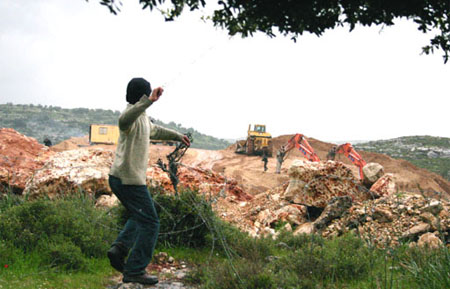
Photo: www.stopthewall.org
|
 Photo: www.stopthewall.org |
| Umm Sa'id Shmeis, Shati' camp, April 4-6:
|
|
At the WEP branch in Shati' camp I meet Wafa', younger than Jamila, a student. Her family lives close by. They are 'returnees' from Libya, so I ask Wafa if she will take me to visit her mother. When we arrive, Umm Sa'id is washing and dressing the youngest of her nine children. It's a large camp home, windowless, divided by sacking or cardboard 'walls' - probably a storehouse converted into living space for a PLO family.
Umm Sa'id's life story is one of the strangest I record. First, it's exceedingly long, stretching over two whole mornings - I run out of tapes and have to come back a second day. Umm Sa'id is a prolific speaker, telling everything - or so it seems - about her own life, and even her parents' lives. Usually it is hard to persuade women to talk - they hesitate, forget, suppress many things as unworthy of recording. But Umm Sa'id tells about every move and every childbirth and every illness. Few accounts I've heard convey more realistically the vastness of the diaspora, the isolation of Palestinians forced to live in special areas in Sudan or Libya, the accidents that befall them, the times they live through without their husband or his salary, or news of family. Another strange thing: right off Umm Sa'id tells me that her mother was Jewish, from Tiberias, and that when her father (from a nearby village called Lubya) married her, his family almost killed him. Her mother died soon after the Nakbah, and soon after that came another tragedy, the death of her older sister. They were living in a camp near Tripoli (Lebanon). It was night. Her father went out to the coffee-house, leaving the children studying by lamp-light, locking the door behind him. A fire started. A neighbour managed to rescue the children but her sister was too badly burned to survive. In 1975, Umm Sa'id married a Palestinian from Gaza, someone who had managed to come to Lebanon illegally, by sea. After that her life became one of continuous moves. There had been only one place where they had felt settled enough to plant |
trees. Each child was born in a different hospital. After each child the doctor warned Umm Sa'id that she must have no more.
The whole story of Palestinian exile is here - not a once-for-all landing in a camp that with time becomes a sort of home, but continuous displacement, border crossings, accidents, sicknesses, delays, separation from family of origin, then from children as they search for education and work. Now they have 'returned' to Gaza but it is not home to any of them - neither Umm Sa'id, originally from Northern Galilee, nor the children who grew up in Libya, nor even Abu Sa'id who left Gaza as a very young man. Unlike Jamila 'Issa, Umm Sa'id hasn't made new friends in Shati' camp. Her husband is conservative and doesn't let her leave home. Besides, nine children don't leave time for visiting. I like the way her dark eyes shine as she tells her sad stories of travel through unfamiliar spaces. There were no magic carpets for this Arab family, life has never been anything but difficult. How can one stay human after a life like that, in a place like this? Yet Umm Sa'id's voice is gentle. She speaks as if she has all the time in the world, managing somehow to dress one child, feed another, remind an older girl of something she has to do, send another to the shop for coffee, and all the while giving her attention to me and my request for the story of her life. The seating here is mainly straw mats, the partitions are canvas. Yet there is a palpable domestic warmth about this cavern of a room that seems to emanate from Umm Said herself and her stories. Umm Sa'id begins her story:"Do you think I remember?! My mother died when I was young. I was six years old when my mother died. My mother was married before my father. She married two men, one from Tiberias. She loved him [Umm Said's father], and he loved her, and they married. Before they married she used to go to him secretly, without her parents' knowing, so he could teach her to read the Qu'ran. She went to him and they married against her parents' wishes, and she became a Muslim." |
[Jamila `Issa] [Lily Saba] Copyright©2005 |